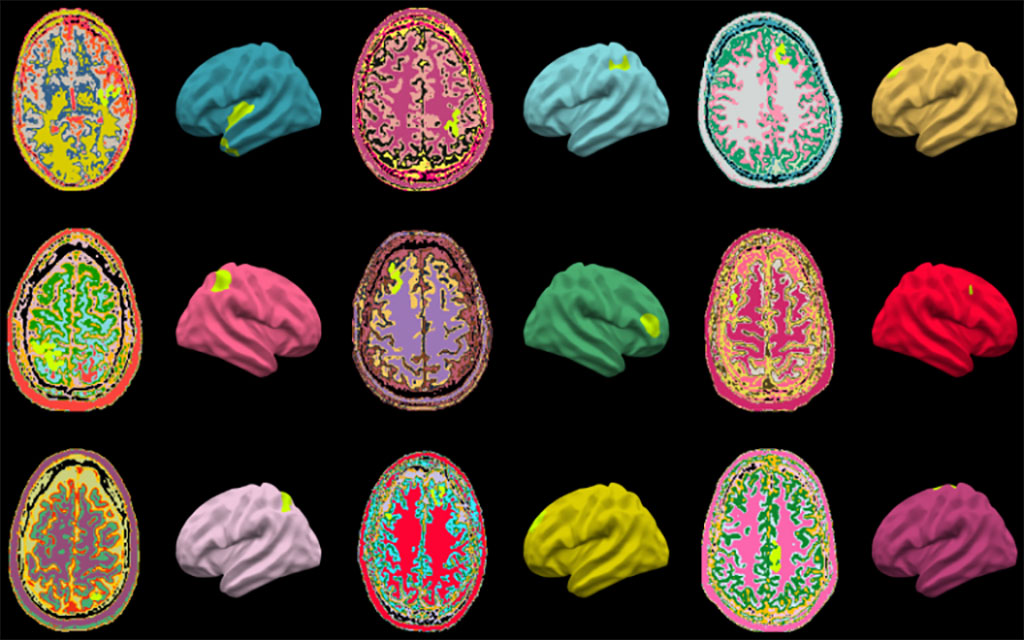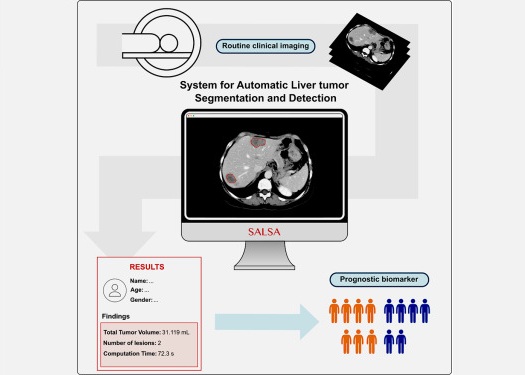AI Algorithm Automatically Detects Brain Abnormalities from MRI Scans
|
By MedImaging International staff writers Posted on 15 Aug 2022 |

Around 1% of the world’s population suffers from the serious neurological condition epilepsy that is characterized by frequent seizures. Drugs treatments are available for the majority of people with epilepsy, although 20-30% do not respond to medications. In children who have had surgery to control their epilepsy, focal cortical dysplasia (FCD) is the most common cause, and in adults it is the third most common cause. FCD are areas of the brain that have developed abnormally and often cause drug-resistant epilepsy. It is typically treated with surgery, although identifying the lesions from an MRI is an ongoing challenge for clinicians, as MRI scans in FCDs can look normal. Now, an artificial intelligence (AI) algorithm can detect subtle brain abnormalities which cause epileptic seizures.
In the Multicentre Epilepsy Lesion Detection project (MELD), a team of international researchers led by the University College London (London, UK) used over 1,000 patient MRI scans from 22 global epilepsy centers to develop the algorithm, which provides reports of where abnormalities are in cases of drug-resistant FCD – a leading cause of epilepsy. To develop the algorithm, the team quantified cortical features from the MRI scans, such as how thick or folded the cortex/brain surface was, and used around 300,000 locations across the brain. Researchers then trained the algorithm on examples labeled by expert radiologists as either being a healthy brain or having FCD – dependant on their patterns and features.
The researchers found that overall the algorithm was able to detect the FCD in 67% of cases in the cohort (538 participants). Previously, 178 of the participants had been considered MRI negative, which means that radiologists had been unable to find the abnormality – yet the MELD algorithm was able to identify the FCD in 63% of these cases. This is particularly important, as if doctors can find the abnormality in the brain scan, then surgery to remove it can provide a cure.
“This algorithm could help to find more of these hidden lesions in children and adults with epilepsy, and enable more patients with epilepsy to be considered for brain surgery that could cure the epilepsy and improve their cognitive development,” said study co-senior author, Dr. Konrad Wagstyl from the UCL Queen Square Institute of Neurology.
“Our algorithm automatically learns to detect lesions from thousands of MRI scans of patients. It can reliably detect lesions of different types, shapes and sizes, and even many of those lesions that were previously missed by radiologists,” added study co-first author, Dr. Hannah Spitzer (Helmholtz Munich).
“We hope that this technology will help to identify epilepsy-causing abnormalities that are currently being missed. Ultimately it could enable more people with epilepsy to have potentially curative brain surgery,” said study co-senior author, Dr. Sophie Adler from the UCL Great Ormond Street Institute of Child Health.
Related Links:
University College London
Latest MRI News
- New MRI Technique Reveals True Heart Age to Prevent Attacks and Strokes
- AI Tool Predicts Relapse of Pediatric Brain Cancer from Brain MRI Scans
- AI Tool Tracks Effectiveness of Multiple Sclerosis Treatments Using Brain MRI Scans
- Ultra-Powerful MRI Scans Enable Life-Changing Surgery in Treatment-Resistant Epileptic Patients
- AI-Powered MRI Technology Improves Parkinson’s Diagnoses
- Biparametric MRI Combined with AI Enhances Detection of Clinically Significant Prostate Cancer
- First-Of-Its-Kind AI-Driven Brain Imaging Platform to Better Guide Stroke Treatment Options
- New Model Improves Comparison of MRIs Taken at Different Institutions
- Groundbreaking New Scanner Sees 'Previously Undetectable' Cancer Spread
- First-Of-Its-Kind Tool Analyzes MRI Scans to Measure Brain Aging
- AI-Enhanced MRI Images Make Cancerous Breast Tissue Glow
- AI Model Automatically Segments MRI Images
- New Research Supports Routine Brain MRI Screening in Asymptomatic Late-Stage Breast Cancer Patients
- Revolutionary Portable Device Performs Rapid MRI-Based Stroke Imaging at Patient's Bedside
- AI Predicts After-Effects of Brain Tumor Surgery from MRI Scans
- MRI-First Strategy for Prostate Cancer Detection Proven Safe
Channels
Radiography
view channel
AI Improves Early Detection of Interval Breast Cancers
Interval breast cancers, which occur between routine screenings, are easier to treat when detected earlier. Early detection can reduce the need for aggressive treatments and improve the chances of better outcomes.... Read more
World's Largest Class Single Crystal Diamond Radiation Detector Opens New Possibilities for Diagnostic Imaging
Diamonds possess ideal physical properties for radiation detection, such as exceptional thermal and chemical stability along with a quick response time. Made of carbon with an atomic number of six, diamonds... Read moreUltrasound
view channel.jpeg)
AI-Powered Lung Ultrasound Outperforms Human Experts in Tuberculosis Diagnosis
Despite global declines in tuberculosis (TB) rates in previous years, the incidence of TB rose by 4.6% from 2020 to 2023. Early screening and rapid diagnosis are essential elements of the World Health... Read more
AI Identifies Heart Valve Disease from Common Imaging Test
Tricuspid regurgitation is a condition where the heart's tricuspid valve does not close completely during contraction, leading to backward blood flow, which can result in heart failure. A new artificial... Read moreNuclear Medicine
view channel
Novel Radiolabeled Antibody Improves Diagnosis and Treatment of Solid Tumors
Interleukin-13 receptor α-2 (IL13Rα2) is a cell surface receptor commonly found in solid tumors such as glioblastoma, melanoma, and breast cancer. It is minimally expressed in normal tissues, making it... Read more
Novel PET Imaging Approach Offers Never-Before-Seen View of Neuroinflammation
COX-2, an enzyme that plays a key role in brain inflammation, can be significantly upregulated by inflammatory stimuli and neuroexcitation. Researchers suggest that COX-2 density in the brain could serve... Read moreGeneral/Advanced Imaging
view channel
CT-Based Deep Learning-Driven Tool to Enhance Liver Cancer Diagnosis
Medical imaging, such as computed tomography (CT) scans, plays a crucial role in oncology, offering essential data for cancer detection, treatment planning, and monitoring of response to therapies.... Read more
AI-Powered Imaging System Improves Lung Cancer Diagnosis
Given the need to detect lung cancer at earlier stages, there is an increasing need for a definitive diagnostic pathway for patients with suspicious pulmonary nodules. However, obtaining tissue samples... Read moreImaging IT
view channel
New Google Cloud Medical Imaging Suite Makes Imaging Healthcare Data More Accessible
Medical imaging is a critical tool used to diagnose patients, and there are billions of medical images scanned globally each year. Imaging data accounts for about 90% of all healthcare data1 and, until... Read more
Global AI in Medical Diagnostics Market to Be Driven by Demand for Image Recognition in Radiology
The global artificial intelligence (AI) in medical diagnostics market is expanding with early disease detection being one of its key applications and image recognition becoming a compelling consumer proposition... Read moreIndustry News
view channel
GE HealthCare and NVIDIA Collaboration to Reimagine Diagnostic Imaging
GE HealthCare (Chicago, IL, USA) has entered into a collaboration with NVIDIA (Santa Clara, CA, USA), expanding the existing relationship between the two companies to focus on pioneering innovation in... Read more
Patient-Specific 3D-Printed Phantoms Transform CT Imaging
New research has highlighted how anatomically precise, patient-specific 3D-printed phantoms are proving to be scalable, cost-effective, and efficient tools in the development of new CT scan algorithms... Read more
Siemens and Sectra Collaborate on Enhancing Radiology Workflows
Siemens Healthineers (Forchheim, Germany) and Sectra (Linköping, Sweden) have entered into a collaboration aimed at enhancing radiologists' diagnostic capabilities and, in turn, improving patient care... Read more




















